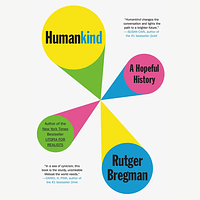Take a photo of a barcode or cover
hopeful
informative
inspiring
reflective
medium-paced
challenging
hopeful
informative
inspiring
reflective
medium-paced
Hmm. Twee dingen, te veel herhaling en heel informeel met z'n "maar toen vond ik dit" enz.
Ik ben al iemand die gelooft dat de meeste mensen deugen, te vertrouwen zijn, en het goede willen doen. Maar doordat het boek zo erg zijn best doet dat te bewijzen ga ik juist twijfelen of dat wel echt zo is..
Ik ben al iemand die gelooft dat de meeste mensen deugen, te vertrouwen zijn, en het goede willen doen. Maar doordat het boek zo erg zijn best doet dat te bewijzen ga ik juist twijfelen of dat wel echt zo is..
funny
hopeful
informative
inspiring
medium-paced
hopeful
informative
reflective
medium-paced
Uplifting counter arguments to a lot of commonly quoted sociological studies that left me feeling somewhat more hopeful than I did before.
informative
inspiring
medium-paced
I was having a really hard time rating this and have decided to just forego it. I read this for one of my book clubs and figured I would enjoy it (especially considering how much I hated choking down Hobbesian philosophy for years as a political science undergraduate, and then again when I decided to start my career in criminal law). I'm glad I decided to finish it, especially since early on I accidentally dropped it in my bathtub. Oops.
First, this was very readable. It avoids going down the textbook path but has enough depth to the sociology to be credible. I think that alone is a great credit to the author. I will say that the title is a little misleading in that this is much more a sociology book than a history book; it's a social sciences read with stories from various points in history sprinkled throughout. If that sounds good to you, then this will be a surprisingly quick, enjoyable read.
Second, I agree with what many other reviewers have said: this book takes many of the opposite positions from someone like Malcolm Gladwell yet falls into many of the same traps. Just because we credit one theory does not mean the exact opposite conclusion is necessarily true. I think this is more of a problem at some parts of the book than others, but the broad generalizations did bother me sometimes. (I was really baffled when at one point, at the end of a paragraph, Bregman claimed that all monotheistic religions stem from the fact that after human populations grew too large, we could no longer see each other and therefore needed to create a God...? What about all the other world religions?) This tendency is the product of the pressure you face when you write a book in the social sciences for a popular audience; I think succumbing to it gets you a much wider readership but undermines your argument a great deal.
Third, this book sort of doesn't know what it wants to be. It seems like three or four books and smaller articles thrown into one. It makes the narrative easier to digest since it's in smaller pieces, but the structure ends up feeling very scrambled. We jump from modern business practices in Holland to junk playgrounds to localized true democracy in Venezuela within twenty pages, and that's just one example. Therefore, I think it's best to read this book like it's written: in small pieces, with some time in between.
Finally, any book that features the 1914 Christmas Truce will move me to tears every time. Rutger Bregman you sly dog...
First, this was very readable. It avoids going down the textbook path but has enough depth to the sociology to be credible. I think that alone is a great credit to the author. I will say that the title is a little misleading in that this is much more a sociology book than a history book; it's a social sciences read with stories from various points in history sprinkled throughout. If that sounds good to you, then this will be a surprisingly quick, enjoyable read.
Second, I agree with what many other reviewers have said: this book takes many of the opposite positions from someone like Malcolm Gladwell yet falls into many of the same traps. Just because we credit one theory does not mean the exact opposite conclusion is necessarily true. I think this is more of a problem at some parts of the book than others, but the broad generalizations did bother me sometimes. (I was really baffled when at one point, at the end of a paragraph, Bregman claimed that all monotheistic religions stem from the fact that after human populations grew too large, we could no longer see each other and therefore needed to create a God...? What about all the other world religions?) This tendency is the product of the pressure you face when you write a book in the social sciences for a popular audience; I think succumbing to it gets you a much wider readership but undermines your argument a great deal.
Third, this book sort of doesn't know what it wants to be. It seems like three or four books and smaller articles thrown into one. It makes the narrative easier to digest since it's in smaller pieces, but the structure ends up feeling very scrambled. We jump from modern business practices in Holland to junk playgrounds to localized true democracy in Venezuela within twenty pages, and that's just one example. Therefore, I think it's best to read this book like it's written: in small pieces, with some time in between.
Finally, any book that features the 1914 Christmas Truce will move me to tears every time. Rutger Bregman you sly dog...
hopeful
informative
medium-paced
informative
inspiring
reflective
medium-paced
Loved this, the positivity and optimism was refreshing and much needed. Faith in humanity restored and I'll no longer be watching the news
challenging
hopeful
informative
inspiring
reflective
medium-paced





